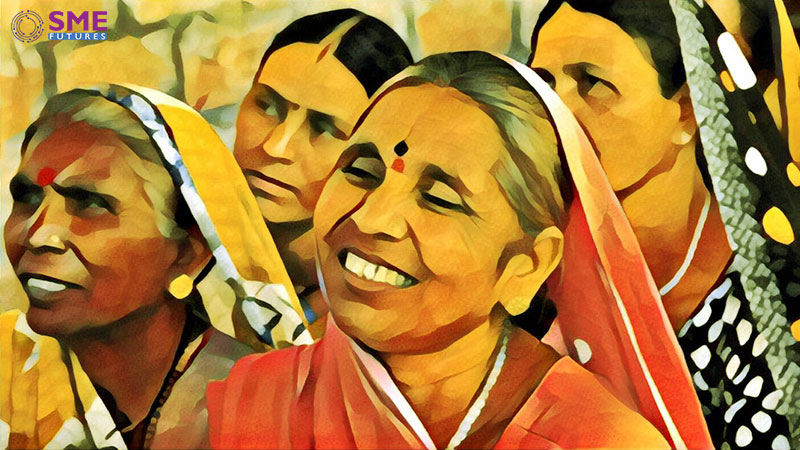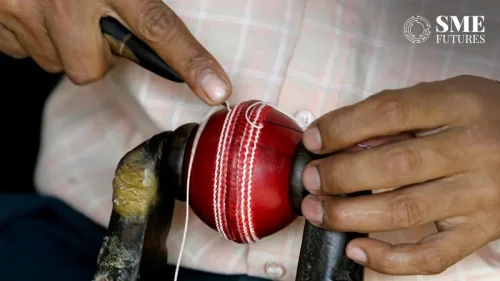A 2016 report published by the British Council titled “The State of Social Enterprise in Bangladesh, Ghana, India and Pakistan” says that there are more than two million social enterprises in India and the number is growing further. Approximately 24 per cent of the social enterprises in the country are led by women.
The role of women entrepreneurs in the process of economic development has been recognised for a long time now in various parts of the world. India is also slowly catching up with the global trend and throwing up more women social entrepreneurs, just as it is adding more women entrepreneurs and leaders in other walks of life. While India is one of the fastest growing economies in the world, it needs more social entrepreneurs to battle social-economic problems, especially women. Unfortunately, existing stereotypes, combined with lack of investor confidence, are proving to be a major hurdle for them.
Padwomen of Kolar
Archana Raj was working with NGO Save the Children when they observed the plight of women in Vemagal, a small town in Kolar district of south Karnataka. Frequent drought meant this largely agrarian society was always grappling with poverty. Due to lack of proper education, approximately 60-70 per cent of the workforce was involved in casual work. Not surprisingly, women’s menstrual health and personal hygiene took a backseat. Sanitary napkins had few takers.

Raj led a project called Samudaya Abhivriddhi (“Community Growth”) in 2016 which is supported by GlaxoSmithKline Pharmaceuticals. Under this project, a sanitary napkin manufacturing unit was set up in Vemagal.
“It was started with a self-help group (SHG) of 10 women who have been trained in manufacturing skills. They visited urban learning centres. They are equipped to handle accounts and maintain stocks. By 2019, the project is expected to involve 40 women in the manufacturing unit and about 100 in the door-to-door sale of sanitary napkins, thus taking the brand Suraksha to a larger market for the product,” says Raj.

The initiative, besides creating hygiene awareness, has helped improve the social and financial lives of women. There has been a significant increase in the average income of the women working at the unit. Changes were also seen in terms of family’s attitude towards them, their own confidence level, communication skills and other behavioural aspects.
Prameela, one of the SHG members, hopes to be able to contribute to household expenses now that she has started earning. Another member, Anitha, is proud that not only has her lifestyle changed, but she has also found recognition within her community.
Their colleague Manjula, says, “It fills me with pride to see how we have come together as a team after a year and have now learnt to solve our own problems, be they personal or professional.”
Art of the matter
“I think that there is a great opportunity for women social entrepreneurs in India, especially mothers returning to the workplace, who develop products and services based on their experience and solve problems in their community. With platforms like Sheroes, Reboot, SheThePeople and Lean In India initiatives that support and invest in women social entrepreneurs, this is the right time to be one,” says US-based Jamie Cid, a social entrepreneur. She is the founder of MobiHires, an audio, video and time-driven job app.
“We focus on building a simple yet effective platform for hiring,” she says. MobiHires facilitates users to create video resume and upload them. It also has built-in video interview tool that facilitates instant interviews and fast hiring. They also offer digital resumes for the hearing impaired, thus opening more avenues for them. “There may be qualified candidates in Tier 2, 3 or 4 cities who can easily interview for a plant job, a tech job or any other position in a Tier 1 city but cannot afford to make the trip. Now they can easily get their video profile and instantly connect via our built-in video interview. We reduce the time and cost (for companies) to hire them and also open up areas of revenue hitherto not available to the people,” explains Cid.
“The platform is free for artisans,” she adds. MobiHires helps local artisans by creating video profiles of their work. This helps them get easily connected with buyers, curators and galleries all over the world who would want to hire or buy from them directly. With the middle man removed, the cut of commissions is reduced and artisans get better money. “If retailers are looking to hire them or buy their products, they can connect via MobiHires,” she says. Considering that in 2016 there were approximately 7 million artisans in India, of which only 2 million are officially engaged (as cited in report titled “Crafting a livelihood” by Dasra), her work could make a huge difference to the community.
In the business of improving lives
In one of the blog posts of World Bank, Monique Villa, CEO of Thomson Reuters Foundation and Founder of TrustLaw and Trust Women, gives the example of Ajaita Shah who works in rural regions of India. Shah’s organisation, Frontier Markets, sells and distributes products to rural households. The organisation calls itself a “for-profit business with a social mission”. They sell solar products including lamps and smokeless stoves to households in rural India and have already reached more than 40,000 households in Rajasthan. As per their website, millions of rural households do not have electricity and rely on traditional fuels like kerosene. Deaths happen either due to respiratory ailments or fire resulting from the use of such fuel.
As her business grows, the living standard of hundreds of marginalised low-income communities also gets betters, Villa says in her post.
Crisis of numbers
According to the World Bank, labour force participation rate for women in India is falling. From 37 per cent in 2004-05, it came down to 27.2 per cent in 2017, which is quite low compared to any other developed countries. Increasing participation for women in workforce is vital to achieving high growth of employment and overall economic growth.
“Despite these low indicators, it is worth mentioning that there are new generation women who have broken the barriers of societal norms and regressive mindsets to pave way to the new world of entrepreneurship. Over the past few years, it has been observed that more women are choosing this as a career over other options, making a mark in the start-up ecosystem. Nonetheless, the aim must be to reach higher, which can help the rest of the women of our country to rise beyond the barriers and choose for themselves,” says Archana Raj. According to the Thomson Reuters Foundation, India ranks 35th among countries that are the best for women social entrepreneurs, with the US, Canada and the UK occupying the top three positions. Talking about the value that women bring to business, one of the male social entrepreneurs who was a respondent in the poll said, “Women are capable of looking at a social problem through the lens of business. They are more compassionate and want a meaningful life. Social entrepreneurs are inherently driven by the urge to improve people’s lives, lifting them out of poverty. Women social entrepreneurs are better at doing this than their male counterparts.”

Manju Yagnik, vice chairperson of Nahar Group and member of Indian Merchant Chamber, begs to differ. It is motivation that keeps the spirit alive, she says, “I personally do not believe in male-female classifications. I do not think capabilities and talent can be differentiated as per gender. Today’s women do not seek sympathy. They want equal opportunities when it comes to decision-making in financial capabilities, which is still male-dominant. Thankfully, with the modern society promoting and striving for gender equality, the position of women is improving year after year,” Yagnik adds. “Women entrepreneurs in India are bringing revolution and growth in the public and private sectors. With the help of government initiatives, they will grow further,” she says.
Gender of challenges
Funders, government and general public still see social entrepreneurship as charitable work. An expert on this subject points out that “just mentioning the word ‘social’ makes investors deaf, dumb and blind”. Analysts say the problem is compounded for women. They have to face awkward questions related to marriage and family during investor meetings, a challenge that men are less likely to face. Moreover, in India, assets and businesses are generally inherited by men. This means women often face constraints like lack of collateral. Other barriers include shortage of adequate number of managerial and technical personnel. Finding and retaining the right talent is another challenge.
The stereotypical thinking of investors is proving a major hurdle for women, agrees Manisha Gupta, founder and director of Start Up!, an incubator and impact accelerator which helps to launch and scale up social enterprise and catalyse the influence and resources of business.To prove her point, she cites the case of a single mother and CEO of a social enterprise who, despite her company’

s good market position and great finance track record, had to face rejection for loan by a bank on the ground that all the board of directors in her business were women.“Regardless of whether a woman is a social or business entrepreneur, she has to negotiate through an eco-system that has been structured for men to succeed. Not only do we need more women social entrepreneurs but also an ecosystem where there are more women leaders at every level. We need them as coaches, investors, in finance, as leading incubators, etc to break the template,” says Gupta.
Commenting on the “explosion of entrepreneurship” in the country, Archana Raj says, “The key is to be able to implement innovative and creative ideas to solve large-scale social problems with an aim to sustain them and at the same time generate income. But the difficulty lies in developing a long-term business model where one can generate funds continuously and sustainably without depending on donations from others.” The challenges go up for women, Raj adds. “Pressures of social norms and societal biases force women to give up the job while tough competitive market further make their work challenging,” she says.
Cid feels that the biggest challenge is to stay positive. “Throughout the journey, social entrepreneurs must remain focused on the bigger picture, the purpose that drove their passion to start. In addition to this, they need to stay abreast of regulations in the areas of their work and also get the support and backing of NGOs and government organisations that can help them as partners. This will ensure that you are building something that can have long-term solutions to issues and inspire confidence in your prospective investors.”
While observing that today women are leading in different fields and playing much larger role at leadership levels across board, Manju Yagnik of Nahar feels there is need for more women entrepreneurs in our country. “Social entrepreneurship might be a great opportunity for Indian women professionals to break through the glass ceiling that typically exists in traditional corporate life,” she says.
Fighting it out
Most women entrepreneurs bring an inclusive and relationship-based approach to doing business. Says Manisha Gupta, “I always say that women social entrepreneurs use the 3Rs – resilience, relationship and resistance – to build and grow their ventures. They are masters of resilience, I have seen many women without any resources, standing on their own and building a business in rural regions. They also demonstrate strong capabilities of building connections and meaningful relationships with stakeholders which takes them far.” According to her, women do what they do through resistance to negative emotions in highly gendered business environment. “It is common to have investors put personal questions to women entrepreneurs or lightly enquire if there is an impending marriage on the horizon. They may mean well, but they aren’t even aware of the signals that they send out by asking these questions. So if we can have many more professional women enter the ecosystem of entrepreneurship in different roles and if the ways of women entrepreneurs doing business can be recognised, I think the conversations will start changing,” she notes.











